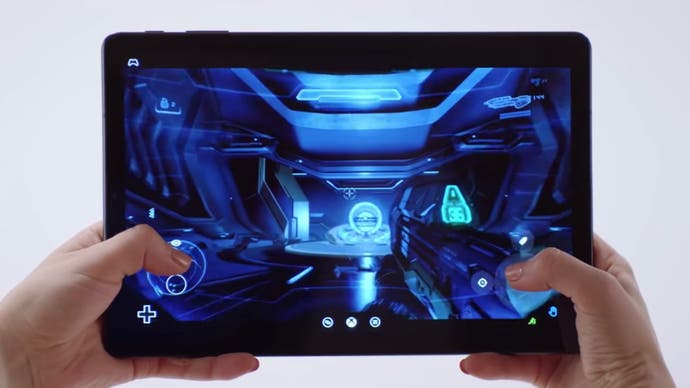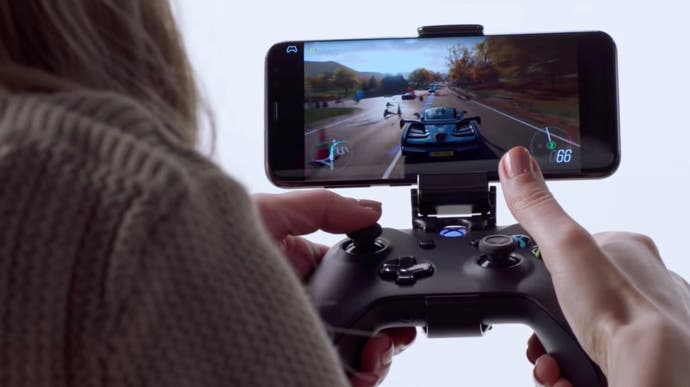Google and Xbox just started the next platform war
And this one will be different.
Game streaming is coming. It's been coming since before we all laughed at OnLive and ignored PlayStation Now, and those too-little-too-soon gambits did nothing to impede its inevitable arrival. It is the future, in the sense that a credible and widely-used iteration of game streaming technology is around the corner and is something everyone reading this will probably end up using. Whether this future will prove mutually exclusive with other futures - those of games consoles and of digital platforms like Steam - is much more debatable. But it's coming regardless.
The games industry was unequivocal on that fact at E3 this year. Ubisoft CEO Yves Guillemot mentioned it to anyone who would listen, while EA promised its own service tied into EA Access. More consequentially (with the greatest respect to EA), Phil Spencer said Microsoft was planning an Xbox-branded game streaming service. Earlier this week, we heard the first details about what Microsoft is calling Project xCloud, in apparent response to last week's announcement of a long-rumoured game streaming offering from Google. Google's Project Stream is already in testing in the US; xCloud hardware is being installed in data centres, but public testing won't begin until next year.
Game streaming is treated as an inevitability because this is the way all media has been going; just look at the rise to ubiquity of the music and video streaming services Spotify and Netflix. But game streaming is a far greater technical challenge, due to the extremely fast-moving and detailed live video and, of course, to its interactive nature, requiring an extremely low-latency two-way dialogue between the client and the server. This is where OnLive fell down and it's part of the reason PlayStation Now still fails to impress (it's also true that Sony has, frankly, never put together a very tempting or marketable offering for it). Low video quality is unappealing, but sluggish controls can break the experience completely.
Nevertheless, Google and Microsoft now judge that the time is right for viable game streaming - and indeed there are already some much more impressive services out there, such as Nvidia's GeForce Now. Home broadband speeds are improving fast around the world, while 4G and 5G make mobile game streaming a possibility. The final piece of the puzzle that these two tech giants bring, as Digital Foundry's Rich Leadbetter pointed out in his analysis earlier this week, is sheer network infrastructure muscle. They have data centres and servers everywhere; they can simply get more server hardware closer to more homes than anyone else (barring Amazon, which, incidentally, is already deeply invested in media streaming, has a gaming division, and owns Twitch, so expect it to have its own plans). More servers closer to your home means lower latency and a better service. This is an ineluctable fact of networking, and an area where smaller players like EA and even Sony are unlikely to be able to compete.
So, if game streaming fulfils its potential and follows the trajectory of other streamed media, the seemingly modest and speculative announcements of the last seven days could prove to be momentous indeed. We could be witnessing, in the early days of Project Stream and Project xCloud, the foundation of ubiquitous game platforms of the future with the potential to rival or even sweep aside players such as PlayStation and Steam. After all, who watches DVDs any more? Or buys CDs?
Well, some do, and this is the first clue that this video game platform revolution could be quite different to those that came before it and perhaps not quite so all-consuming. Particularly relevant has been the rise of vinyl records in the face of digital and streaming music. Vinyl, with its warm analogue sound and large, beautiful packaging, provides a tangibly different experience to streaming, which is more than you can honestly say of CDs. It's more tactile and intimate. I think the same is likely to be true of games, where hardcore fans and competitive players are highly attuned to the responsiveness of the controls. No matter how good streaming gets, local gaming will always feel different. You can imagine some players resolutely sticking to local hardware, while others might prefer it for some games (FIFA, Street Fighter) while being happy to enjoy a slower-paced experience like Assassin's Creed over the net.
Microsoft has already started marketing Xbox One X as if it were a high-end bit of hi-fi kit - a luxury for those who want the very best, and a beautiful, no-expense-spared engineered object in its own right, priced accordingly. It is preparing console players to start thinking of different quality grades in their gaming and different levels of investment in their hobby, as opposed to the guaranteed standard experience once implicit in the console offering. This marketing strategy would sit very neatly alongside a streaming service, and indeed at E3 Spencer promised multiple new Xbox consoles, suggesting a streaming box as well as a next-gen console, with Xbox One X likely sat between them.
In fact, streaming fits so neatly into Microsoft's philosophy and strategy for Xbox that it is clear Spencer's team has been planning it for some years now. The Game Pass subscription service in particular seems purpose-built for streaming, but every major move Microsoft has made over the last several years has pointed towards thinking of the Xbox platform as extending beyond console hardware to be something more all-encompassing: the unification of first-party games across Xbox One and Windows 10 with Play Anywhere; the acquisition of Minecraft, a game too big to be contained by a single platform; the openness to cross-platform play; the backwards compatibility drive that has preserved a large part of the Xbox 360 library and even some original Xbox games for the digital future. All of it has presented Xbox as a service, not a box, and Xbox games as something that can live beyond one box. All of it positions Microsoft perfectly for a streaming future.
Google has as much engineering and infrastructure might as Microsoft, if not more, and it has a colossal gaming audience on YouTube to market its streaming service to. But it has a lot of catching up to do in other areas. Project Stream is based on a new, bespoke hardware and OS, whereas Project xCloud is based on Xbox One S, which developers everywhere are intimately familiar with and already publishing to. With Game Pass, Microsoft has a subscription catalogue already assembled and ready to roll. And, crucially, Xbox has many exclusive games and first-party studios. After appearing to withdraw from first-party production for a while, Microsoft is all-in again, having acquired Playground Games, Ninja Theory, Undead Labs and more earlier this year, with a rumoured buyout of Obsidian Entertainment in the offing. Google will have to work hard to match this, though of course it could not have deeper pockets.

This is one area where the coming streaming platform war could be great for players and the games industry: I expect it will bring with it a massive wave of investment in exclusive content. Look at how Netflix and Amazon's tussle for supremacy has transformed the TV and film industries as they have flooded them with cash, looking for hits and for high-quality productions that will win Emmys and Oscars and burnish their brands, making adventurous bets and mitigating the Hollywood studios' retreat into risk-averse, rote franchise programming. (It's not all been positive; the investment in production hasn't been met with equivalent investment in marketing, leaving many of these shows and films to die on the vine. But still.) Now imagine what that might look like in games.
The console wars, to date, have been high-stakes battles to capture a customer for the next five-year cycle. With subscription services, it is far easier for people to come and go as they please, so you need to keep them hooked with a constant flow of stuff they can't get anywhere else. Exclusives are the best way to do that, and first-party production is the best way to get exclusives. If big companies like Microsoft and Google are more motivated to fund ambitious game production - and if and the barrier to entry to get at those exclusives is far lower than it is currently, with little or no bespoke hardware needed - well, that can only be a good thing for players.
This, then, should be a platform war that, in stark contrast to those that preceded it, means more choice and more freedom for people who love games. Even if you are sceptical about the technology, that should be something you can get behind.





-3-31-23-screenshot.png?width=291&height=164&fit=crop&quality=80&format=jpg&auto=webp)





